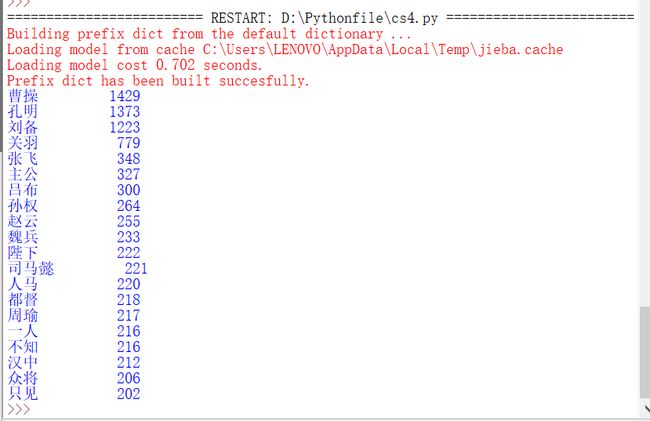文本词频统计
一、概述
1.需求:一篇文章,出现了哪些词?哪些词出现得最多?
2.首先,要知道英文文本和中文文本的词频统计是不同的
二、“HAMLET”
1.噪音处理:提取单词,去除不必要的其他东西。
2.提取单词,split按空格切分,形成列表
3.统计单词和对应的词频,使用字典
4.词频按关键字:出现次数 排序,使用列表sort method
5.输出
Hamlet
def gettext():
text = open("hamlet.txt",'r').read()
text = text.lower()
for ch in '"#$%^&*()_+-,./<>=@{}[]\~\'':
text = text.replace(ch,'')
return text
hamlettext = gettext()
words = hamlettext.split()
counts = {}
for word in words:
counts[word]=counts.get(word,0)+1
items = list(counts.items())
items.sort(key = lambda x:x[1],reverse = True)
for i in range (20):
word,count = items[i]
print("{0:<10}{1:>5}".format(word,count))三、《三国演义》人名出场次数统计
1.第一版
#三国演义
#first,get words;second,count the times word appear in text;third,print the top 20
import jieba
txt = open('三国演义.txt','r',encoding='utf-8').read()
words = jieba.lcut(txt)
counts = {}
for word in words:
if len(word)==1:
continue
else:
counts[word] = counts.get(word,0) + 1
items = list(counts.items())
items.sort(key = lambda x:x[1],reverse = True)
for i in range (10):
word,times = items[i]
print('{0:<10}{1:>5}'.format(word,times))发现问题:
孔明和孔明曰应该算作一个人
荆州等不是人名
改进:
从列表中删除非人名词组
在建立集合统计词语出场次数的时候,把孔明和孔明曰,算作一个次。

2.第二版
import jieba
txt =open('D:/pythonfiles/三国演义.txt','r',encoding='utf-8').read()
excludes = {'将军','却说','荆州','二人','不可','不能','如此','如何','军士','商议','左右','军马','次日','引兵','大喜','天下','东吴','于是','今日','不敢'}
words = jieba.lcut(txt)
counts = {}
for word in words:
if len (word) == 1 :
continue
elif word == '诸葛亮' or word == '孔明曰':
reword = '孔明'
elif word == '玄德' or word == '玄德曰':
reword = '刘备'
elif word == '关公' or word == '云长':
reword = '关羽'
elif word == '孟德' or word == '丞相':
reword = '曹操'
else :
reword = word
counts[reword]=counts.get(reword,0)+1
for word in excludes:
del counts[word]
items = list(counts.items())
items.sort(key= lambda x:x[1],reverse = True)
for i in range(20):
word, count = items[i]
print('{:<10}{:>5}'.format(word,count))三国演义TOP20
import jieba
txt = open('三国演义.txt','r',encoding='utf-8').read()
txt = jieba.lcut(txt)
counts = {}
def countword(a):
global counts
counts[a] = counts.get(a,0)+1
for word in txt:
if len(word) == 1:
continue
elif word == '孔明曰' or word == '诸葛亮' :
word = '孔明'
countword(word)
elif word == '玄德' or word =='玄德曰' or word == '主公' or word == '先主':
word = '刘备'
countword(word)
elif word == '丞相' or word == '孟德':
word ='曹操'
countword(word)
elif word == '关公' or word == '云长':
word = '关羽'
countword(word)
elif word == '都督':
word = '周瑜'
countword(word)
elif word == '后主':
word = '刘禅'
countword(word)
else:
countword(word)
excluse = ['二人','不可','荆州','却说','不能','将军','如此','军士','如何','商议','左右','次日','引兵','大喜','天下','东吴','军马','于是',
'今日','不敢','陛下','魏兵','人马','一人','不知','汉中','众将','只见','蜀兵','大叫','上马','此人','太守','天子','背后','后人','城中'
,'一面','何不','忽报','大军','先生','何故','然后','先锋','夫人','不如','赶来','原来','令人','江东','徐州','正是','忽然','下马','喊声'
,'成都','因此','百姓','未知','大败','一军','大事','之后','不见','起兵','接应','军中','进兵','引军','大惊','可以']
for i in excluse:
del counts[i]
items = list(counts.items())
items.sort(key = lambda x:x[1],reverse = True)
for i in range(20):
item ,times = items[i]
print('{0:<10}{1:>5}'.format(item,times))


